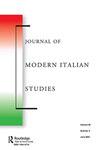我辉煌的城市:那不勒斯、城市贫困和埃琳娜·费兰特的“民族志想象”
IF 0.7
3区 历史学
Q1 HISTORY
引用次数: 0
摘要
摘要埃琳娜·费兰特的《那不勒斯小说》于2012年至2015年以英文出版,讲述了两位出生在战后那不勒斯贫困社区的女性的成长故事。这部由四部分组成的系列小说在国际上取得了成功——意大利版以第一部小说《我的光辉朋友》的名字命名——证明了那不勒斯城市穷人作为一个文学主题的持久受欢迎。本文讨论了该系列中出现的城市贫困的几个关键问题(即社会排斥、贫民窟化、普遍的非法行为、地方性暴力和妇女压迫),并分析了这些问题的叙述方式,借鉴了民族志学术的两个经典文本:托马斯·贝尔蒙特的《破碎的喷泉》(1979)和伊塔洛·帕尔多的《那不勒斯的生存管理》(1996)。在这样做的过程中,它从社会人类学的角度重新考虑了费兰特的叙事,并针对那不勒斯城市穷人文学中的两种对立倾向评估了她的“人种学想象”:一种倾向于污名化,另一种则倾向于浪漫化。因此,文章认为,“那不勒斯小说”对一个根深蒂固的刻板主题进行了令人耳目一新的解读,(至少在一定程度上)对抗了传统上影响那不勒斯城市穷人文学表现的“他者化”过程。本文章由计算机程序翻译,如有差异,请以英文原文为准。
My brilliant city: Naples, urban poverty and the ‘ethnographic imagination’ of Elena Ferrante
ABSTRACT Elena Ferrante’s ‘Neapolitan Novels’, published in English between 2012 and 2015, tell the coming-of-age story of two women born in a poor neighbourhood in post-war Naples. The international success of this four-part series of novels – named in the Italian edition after the title of the first novel, L’amica geniale (‘My Brilliant Friend’) – testifies to the enduring popularity of the urban poor of Naples as a literary subject. This article discusses several key issues of urban poverty that emerge from the series (i.e. social exclusion, ghettoization, widespread illegality, endemic violence and women’s oppression) and analyses how they are narrated, drawing on two classic texts of ethnographic scholarship: Thomas Belmonte’s The Broken Fountain (1979) and Italo Pardo’s Managing Existence in Naples (1996). In doing so, it reconsiders Ferrante’s narrative from a socio-anthropological perspective and assesses her ‘ethnographic imagination’ vis-à-vis two opposing tendencies in the literature about the urban poor of Naples: one geared towards stigmatization and the other towards romanticization. The article thus argues that the ‘Neapolitan Novels’ offer a refreshing take on a deeply stereotyped subject, countering (at least in part) the process of ‘othering’ that traditionally affects the literary representation of Naples’ urban poor.
求助全文
通过发布文献求助,成功后即可免费获取论文全文。
去求助
来源期刊

Journal of Modern Italian Studies
Multiple-
CiteScore
1.00
自引率
25.00%
发文量
66
期刊介绍:
The Journal of Modern Italian Studies (JMIS) is the leading English language forum for debate and discussion on modern Italy. This peer-reviewed journal publishes five issues a year, each containing scholarly articles, book reviews and review essays relating to the political, economic, cultural, and social history of modern Italy from 1700 to the present. Many issues are thematically organized and the JMIS is especially committed to promoting the study of modern and contemporary Italy in international and comparative contexts. As well as specialists and researchers, the JMIS addresses teachers, educators and all those with an interest in contemporary Italy and its history.
 求助内容:
求助内容: 应助结果提醒方式:
应助结果提醒方式:


